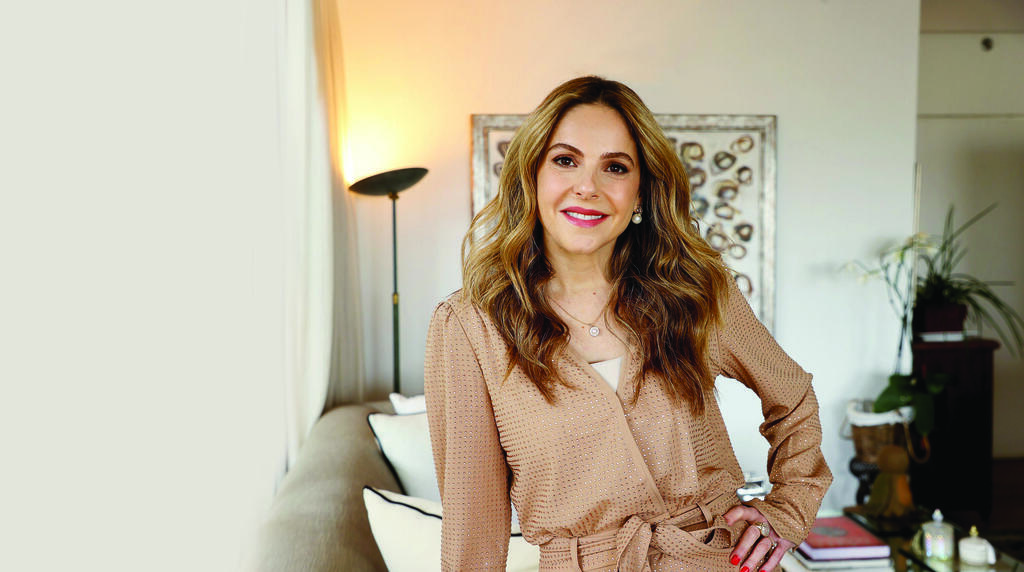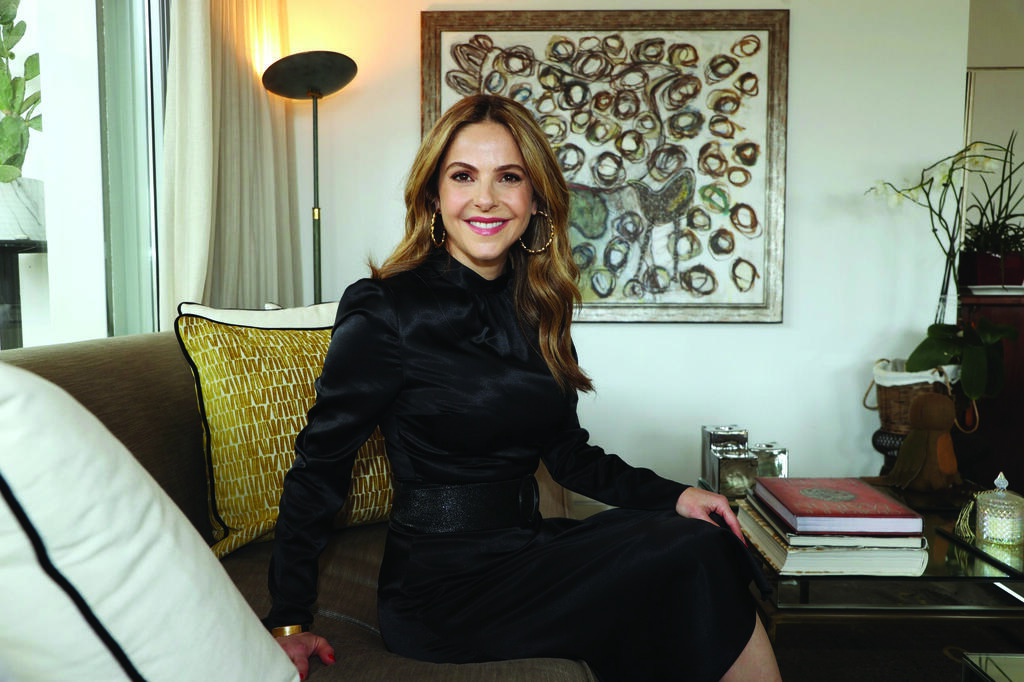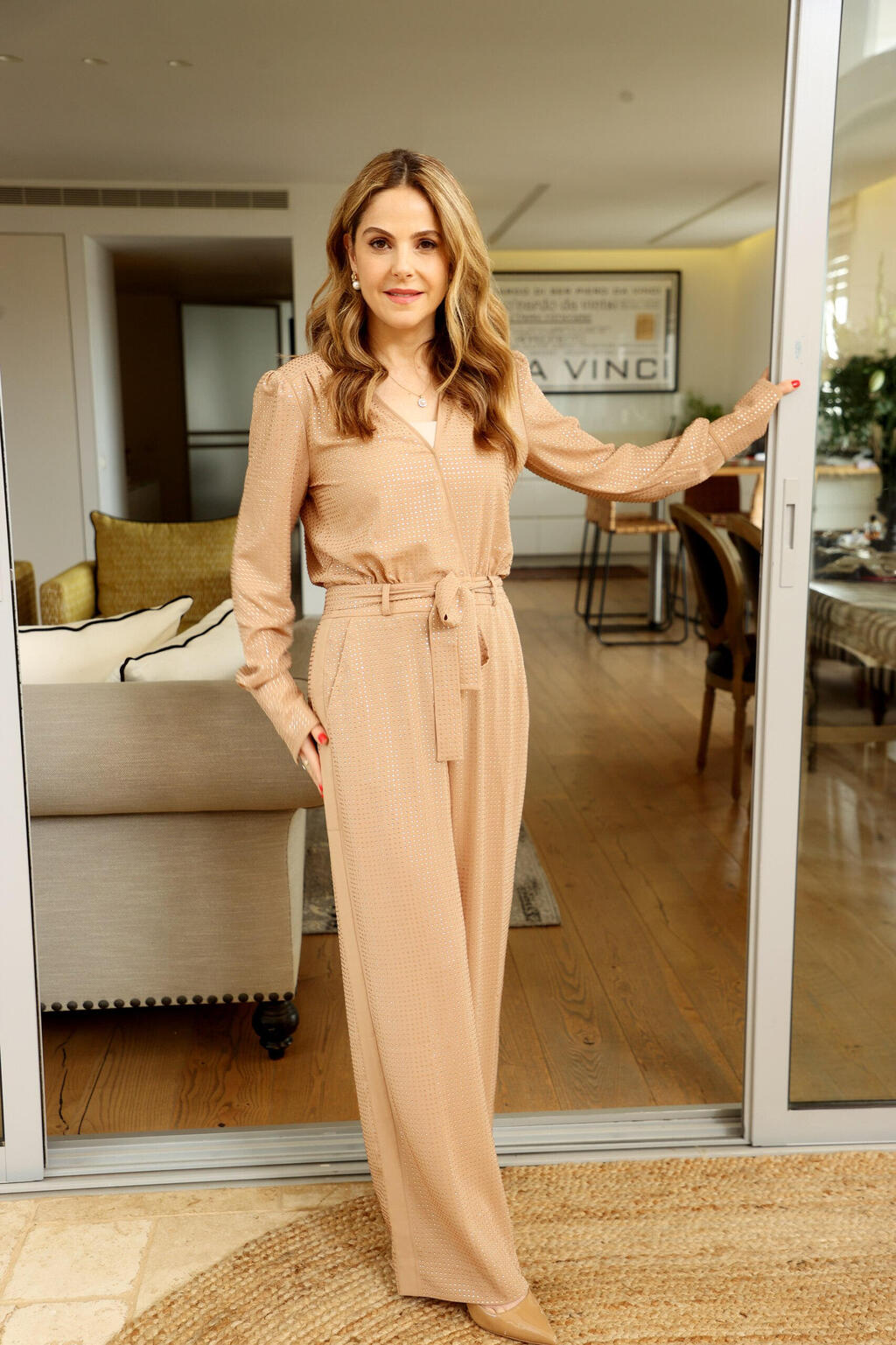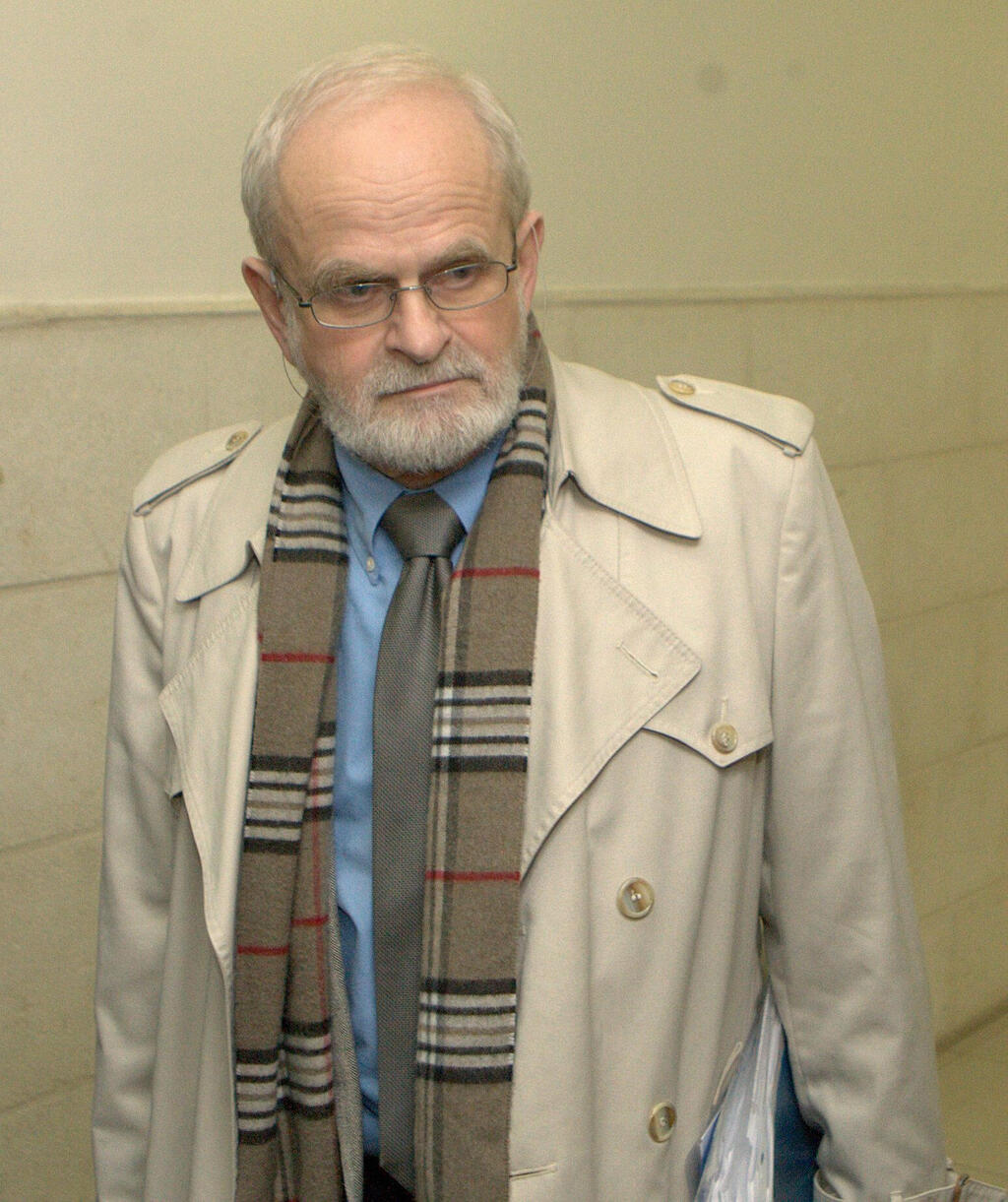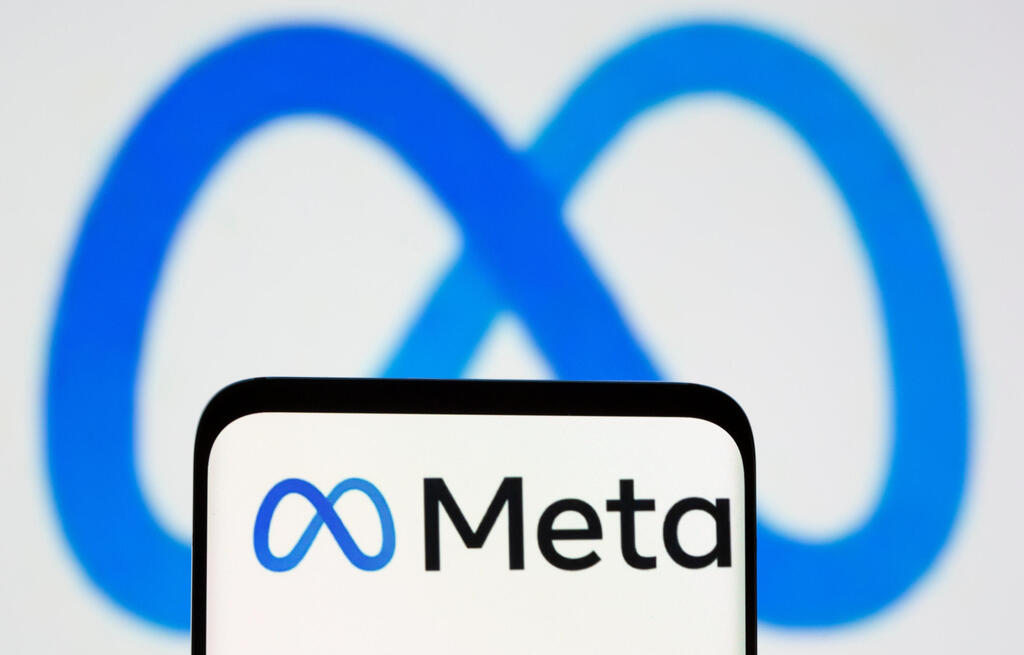Every night, until the age of fifteen, Michal Oshman used to dream that the Nazis were coming to her house riding on top of an eagle, pulling her out of her bed, and taking her to Germany.
Read more:
Sometimes motifs from her dad’s work, Prof. Yehuda Hiss, who was director of the Institute of Forensic Medicine and Israel’s head forensic pathologist for a couple of decades, were mixed in the dream.
Criminals she read about in the newspaper and against whom her father testified (as the one who did the autopsy on the bodies of the murdered) also came into her dreams. "I grew up in a house filled with sadness and fear," she tries to explain the roots of the nightmares. "My grandparents, Holocaust survivors, lived next door to us when we lived in Ramat Gan and they raised me.
"My grandmother, who was preparing for the next Holocaust, fed me, a three-year-old, large quantity of chicken soup in the morning. Today, if I just smell chicken, I immediately sense that feeling of the fat and skin in the throat. I used to hide cans of tuna with her around the house. After she passed away, my mom found dozens of these cans and baby food formulas scattered around her house."
Wow, that’s tough.
"From day one, my grandmother used to tell me about what she had been through. She was a draper and heard from other traders, who came from distant villages, that something was going on. She begged her parents to leave. They refused. She took a pair of shoes and a coat and ran away. That was the last time she saw them and her sister. Her brother who followed her, was separated from her in the forest. She never saw him again either. “My grandmother had beautiful, kind eyes and I felt sorry for her, so I agreed to eat. At night, I would hear her begging in Yiddish not to take me, her eldest granddaughter."
And on top of that, you were exposed to the work of your father - the most famous pathologist in Israel.
"I understood from a very young age that my dad dissects corpses. We could be on our way to a family wedding, when he would get a call that made us go with him to a crime scene of an attack or a murder. My mom and I would sit in the car waiting for him. No one was really thinking about the little girl in the backseat who sees everything that is happening. I had an instinct to turn my head to the other side, but I saw the police and the overwhelmed families arriving at the scene in a storm of emotions.
"I became the joke of the team after I wrote on the board 'the gym is closed' but instead of writing 'gym', I wrote 'jam'. I came back home, to a tiny flat, at 11pm, humiliated. I asked myself what was I thinking when I came here?"
“I was a curious girl who would pass by the desk and look at harsh photos and the news in the paper about confrontations between criminals and my dad in courts. There were times when the police would come over to check our cars. I grew up in northern Tel Aviv, seemingly a spoiled girl, but I realized that in life there are disasters and there are terrible things that people do to each other. For me, life was one continuous pain. I would wake up without air. Suffocated."
Today, as a mentor, Michal seeks to take the elements of fear and anxiety that often grip us in modern life, replacing them with peace of mind and growth. In her new book, The Courage to Be Afraid On the Road to Success: The Guide to a Life and Career Full of Joy and Meaning (publisher: Yediot Sefarim), Michal provides a range of practical tools, drawn from her discovery in the Tanya, a fundamental book in Hasidism that talks about the human soul.
She has adapted these methods into modern language. "I aspire to be the Jewish Tony Robbins, the one who teaches how to channel our childhood experiences to create a meaningful life."
I wasn't invited to mom meetings
Oshman, 48, is married to Yair, a partner in an investment company, a mother of four and has been living in London for the past 20 years. The interview with her took place as she arrived in Israel with her daughter to find a pre-military program for her.
"My daughter expressed a desire to go straight to the army, but I advised her that as she didn't grow up here, it might be best if she prepares herself for it. She has already informed me that it is a one-way ticket."
On our second meeting, held on Zoom, Michal wears a Facebook T-shirt and drinks water from a TikTok bottle - two places where she held senior positions. She has a bachelor's degree in sociology and anthropology from Tel Aviv University and a master's degree in organizational sociology from Haifa University.
When she finished her studies, she worked in an organizational consulting company ("On the weekends I would do shifts at 'Giraffe noodle bar’. I suffered from anxiety and emotional difficulties so much that I just wanted to be busy all the time"). Soon after, Michal got married, the couple moved to London, where Yair was accepted into a prestigious program at London Business School.
“I made Yair sign a contract on the way to London saying we are staying there for only 3 years. In the end, I was the one who didn’t want to come back.”
How was your start in London?
"I arrived at a place where they didn't know how to pronounce my name and I didn’t understand what people were saying to me. I didn't know anyone and there were no Facebook groups then. Yair was a student, and someone had to provide for our expenses.
"I started working at a spa. I would leave the house at 5am, take a bus to the other side of town, and my job was to hand out towels to guests going to the gym. I became the joke of the team after I wrote on the board 'the gym is closed' but instead of writing 'gym', I wrote 'jam'. I came back home, to a tiny flat, at 11pm, humiliated. I asked myself what was I thinking when I came here? I sent resumes and left messages for recruiters, 'This is Michal from Israel.' The recruiters didn’t relate to me, they saw me as an immigrant who doesn’t belong in the UK.
"The turning point came when an Israeli lady introduced me to a successful organizational consultant who she said would try to help me. We met in a cafe. He told me, 'I'm going to do you a favor. Your only way to survive here is to give up all your dreams. The only things you can do here is to be a teaching assistant at the university, a secretary or a homemaker.'"
That consultant truly helped her - he imbued Michal with the determination to charge the job market fiercely. "I came back home and told Yair. He stood up and said 'F*** it. That consultant is wrong, you’ll thrive here just as you did in Tel Aviv". I shook off what that consultant told me. I decided to change my whole outlook. I'm not Michal from Israel anymore and I'm not a 'spa towel handout girl' either. I am a 'reception manager at an entertainment organization'.
I learned to present myself in the context of English culture and the floodgates opened. I started getting crazy job offers. I found myself between an established bank and a large energy company."
"I came home when the kids were already asleep. Senior female executives in the world of tech and social media don’t speak enough about the personal challenging moments in which they disappoint the kids, when they are not present enough"
A year after moving to London, Oshman started working as a leadership development team leader at the Bank of Scotland. "I worked extremely hard to acquire British English. I stood in front of the mirror and memorized difficult words. I sat for hours in the library. I wrote new words in a notebook. I also worked really hard at the bank and I noticed that they loved it. My colleagues went to the pub at around 4-5pm, and I stayed at work until 7pm. Four months after I gave birth to my first daughter, I announced that I was coming back to work. The boss couldn't believe it, women here take a year's maternity leave. I was promoted to a senior position in the Organizational Consulting Department."
After four years at the bank, she worked for a short time at the global Danone company as the head of leadership development and management, and then gave birth to her son. Later, after an episode as an independent consultant in London and Israel, she went on to the advertising giant WPP as head of organizational learning.
In 2011, she arrived at the first tech company in her career, eBay. "I was appointed head of leadership and culture development. I loved the tech world. I traveled all the time and gave leadership workshops in the company."
In 2014, she arrived at Meta (then Facebook), as the person responsible for developing organizational culture and leadership at Facebook Europe. On her first day at the offices in London, she encountered the company's slogan at the entrance. "What would you do if you weren't afraid?"
"It's an entire corporate culture that gives you an invitation to cross your inner fear barrier," she describes. "A place where you receive real feedback every day. It is completely legit that at the end of a meeting with Sheryl Sandberg, she will tell me one good thing I did and one thing that needs to be improved. You constantly receive feedback on what meaning you create. If you are curious about yourself and want to grow, it's an amazing place."
It can also paralyze - being criticized on a daily and even hourly basis.
"I felt loved and protected at Facebook; they didn't turn this feedback culture into a means of settling scores. This culture only empowered me. It is an organization that is founded on the strengths of its employees. They constantly check with you what your passion is and encourage you to accomplish it. Those who are creative and hard workers, can grow. I was almost 38 years old, and at a point in life I told myself, 'After all your life you have focused on how scared you are, what you are not good at and how much you don't want to be a failure, come look at yourself and say what you are really good at.'
"We have all lived his role. It meant sitting at the table on Seder night, and then there is an attack and he goes to the Institute of Forensic Medicine or to the terror scene. We worried about his emotional state, as after the identification process for the deceased is complete, you need to deal with the living and their families"
It sounds like an intense job that doesn't leave much time for personal life.
"I was already a mother of three and I realized that I could not be on several fronts. I came home when the kids were already asleep. I chose to pay for childcare, we had an au pair and a babysitter. Senior female executives in the world of tech and social media don’t speak enough about the personal challenging moments in which they disappoint the kids, when they are not present enough."
Perpetual loneliness
Michal is Prof. Hiss's eldest daughter. Her mom was an educational consultant. She has a sister who is almost seven years younger than her. "The house was very scientific. At the age of eight, I asked my dad if it was possible that inside the big body there was a smaller body, which the Kadisha community does not bury. In this small body, there is love that I feel for my grandparents and for you and mom. I didn't know then to call it a soul. He said to me, 'No, we are just a body. After you die, nothing remains'.
"His answer made me depressed. I knew I had the smartest dad in the world, a world expert in medicine, I had no chance of challenging him. I felt that something had gone off inside me."
What did the rest of your childhood look like?
"There were a lot of expectations from me. I was the first daughter and the first granddaughter. From the outside, I was the ‘best girl’, sociable and functional. I always answered with respect, I was a troop guide with the Scouts, I invested in my studies. I never had any problems. But inside I had unpleasant thoughts.
"Life was the scariest thing in the world. I would wake up three times a night, to check that the parents were still breathing. I would go to school, and in my heart, I would say goodbye to them. I was afraid I would explode on a bus. I was not afraid of death, I was afraid of arriving as a corpse to my dad's workplace. I knew from his colleagues that if you sit near an open window, it reduces the impact of the injury. So that's what I would do."
It sounds like you were very involved in his profession.
"We have all lived his role. It meant sitting at the table on Seder night, and then there is an attack and he goes to the Institute of Forensic Medicine or to the terror scene. This means that he is at the institute for a week until the identification process of all the bodies is finished and only then does he return home. It fell upon us to bring him a change of clothes and a sandwich, because otherwise, he wouldn't eat. We worried about his emotional state, as after the identification process for the deceased is complete, you need to deal with the living and their families."
Your father's career was tarnished by the organ affair. It was discovered that the institute under his leadership preserved organs of the deceased without informing the families.
"It hurt me. I saw his dedication toward his job all these years, he received offers from overseas and didn't even consider them, because he found meaning in his work. It is important for me to say that he was not fired. He continued working until he was 67, the retirement age. This would not have happened if he had not worked according to the rules, as they claimed against him. When he retired from the institute, he continued to write and teach as one of the world's leading forensic pathologists."
Let's get back to you. Did your parents know anything about what you were going through?
"Nobody knew anything. It was a constant feeling of loneliness and sadness. I didn't think we were supposed to be happy in this life."
After serving in the IDF as an operations officer, Michal began psychological therapy. "One Saturday on base, I opened up to my closest fellow female officers about what it means to be me. I carried with me an overwhelming guilt that by dating someone and starting to feel happiness, I was tempting fate, as if something terrible was bound to happen. Their reaction was unexpected - they all began to cry. It was at that moment that I realized I wasn’t just a sad person; I felt as if I were doomed.
"When I was discharged, I started going to therapy. I could talk about feelings. Until then I didn't have words, I had no emotional vocabulary. I came to the realization that nowhere does it say that I have to be a Yad Vashem tasked with remembering the names of every family member or being responsible for maintaining the household’s morale when my dad returned late after identifying an entire family who was murdered. It was a moment of relief as some of that responsibility finally lifted from my shoulders.
"I was in therapy for 15 years. I changed several therapists, they sent me to talk with my parents, to ask them what they were thinking when they exposed a little girl to such harsh content. My parents explained to me that they hadn't thought about the implications of this. At some point, I realized that none of this was helping me. I still found myself getting up at night to check on my kids, walking to the underground station only to return home and ensure our nanny had cut grapes into small pieces to prevent choking. I looked in the mirror and saw someone withered."
New tears
In the search for healing, Oshman discovered the Jewish spiritual world. "As I approached the age of 40, I saw it as an opportunity for something new. We live in the Jewish neighborhood of Golders Green. One Saturday morning, I observed a family going to synagogue. Their tranquility and peace struck me. I remembered a friend who eagerly prepared for Passover and told me that it is a holiday in which we get rid of the internal chains that weigh us down.
"In search of answers and tools to heal, I went to Google and typed 'Anxiety, Fear, Joy, Meaning' and then added 'Judaism'. Google’s recommendation led me to contact a religious Jewish therapist who, surprisingly, encouraged me to attend Tanya classes. I wondered what a Hasidic class could offer."
And you went to class?
"It was the day I was supposed to give a lecture at an event at the office and I was dressed in bright red lipstick, skinny jeans and stilettos. I had reached a point where I didn't care about my plans. I canceled my afternoon plans and hailed a black cab. I arrived with a laptop and two cell phones, intending to work whilst I was there. But when the rabbi came in and started talking about a spark of a soul, about pain and sadness, his words started to resonate with me and I started to cry. These were new tears. Tears of recognition that I have a soul. Something I had sensed from a young age, despite being told otherwise."
"Life was the scariest thing in the world. I would wake up three times a night, to check that the parents were still breathing. I would go to school, and in my heart, I would say goodbye to them"
And then you joined a weekly class?
"Yes, there was even a work event with Kate Moss and I chose to skip it and attend class instead. It marked the beginning of a sweet journey of discovery. However, I did not immediately embrace these beliefs. It was a gradual process, leading to a point where I began to truly believe. I came to understand that the soul is divine and remains untarnished, never wounded, corrupted or deluded. It was the realization that God wants you to be here because you have a role, a purpose. There is a Hasidic saying that the day you were born is the day God decided that the world needed you."
Where are you today on the religious spectrum?
"We are masorti, observing Shabbat and keeping kosher. Our children go to a Jewish school. I gave Yair my word that I would not cover my hair. When I started this journey, I would light candles and then go on a weekly date with him. I recall one time when I lit the candles and we returned at 1am on a Saturday. It makes me laugh thinking about it today.
"Later on, I decided to delve deeper into understanding Shabbat and went onto Google to learn more. I found out there is a blessing and a certain time to light the candles. More time passed and I decided that I wanted to get more into this Shabbat ritual. The decision surprised Yair. I acknowledged that I was asking for something big, but I asked him to trust me. Today, he is fully committed to it; otherwise we wouldn't have continued with it.
"At first, we kept Friday nights as religious and on Saturdays the house would return to itself. I would drive the kids to their [soccer] games and friends, even squeezing in manicures and pedicures. Then came one Saturday morning when I realized that I really didn't feel like opening my mobile phone and we started to observe Shabbat completely."
6 View gallery
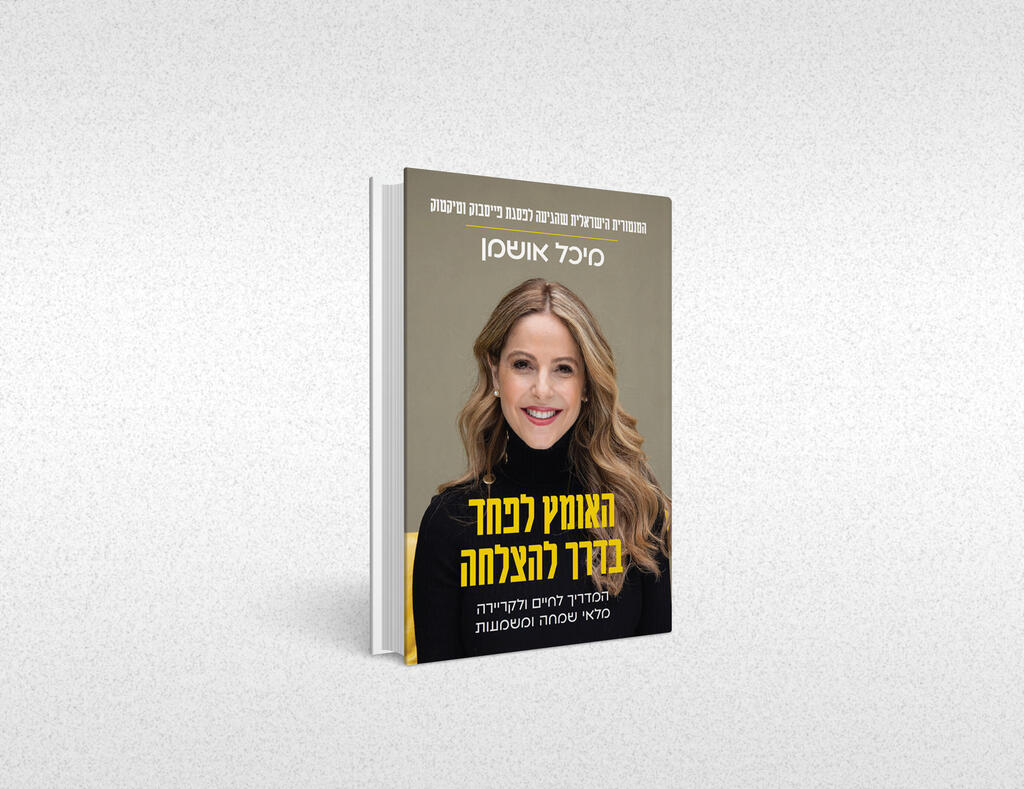

The front cover of the Hebrew edition of Oshman's latest book The Courage to Be Afraid On the Road to Success
What do the parents think about it?
"My parents were used to our culinary repertoire of calamari and shrimp. Nevertheless, they reacted with respect and acceptance. My dad wasn’t surprised and commented, 'It's very nice.' They even join us to celebrate the holidays, and when we are in Israel, they make sure to purchase kosher items in advance for our convenience. My mom started learning Tanya and the Yamima method. She says it's a shame she waited until she was 70."
Kosher sushi in the bag
For nearly three years, Michal worked at TikTok as the global head of company culture and the CEO's advisor for company culture and management. "It's a position that is very hard to say no to. During my introductory meeting and lunch with the CEO of TikTok global, I brought kosher sushi on a plate wrapped in clingfilm. Dressed to impress, carrying a Chanel bag and my plate of sushi peeking out of my bag! As soon as the food was placed on the table and I pulled out my food, everyone was interested in what allergy I was suffering from. I explained to them that it wasn’t an allergy, I eat kosher. The CEO smiled at me as a gesture of approval and encouragement for me to be myself."
What was it like to work there?
"It wasn’t like working at any other company I've worked at. Many of the company’s employees were recruited during COVID, and as a result, we only worked via Zoom. We were creating an organizational culture in a company where people work at home. I recently completed my tenure there. It's scary to leave a place that gives you status, an opportunity to influence and a respectable income. But every now and then I ask myself the question: ‘What would I do if I wasn't afraid?’ And the answer is that I want to set out on my own as a mentor."
Michal’s book, originally called ‘What Would You Do If You Weren't Afraid?’, a best-seller on Amazon was published two and a half years ago in the prestigious publishing house Penguin Random House. The title was inspired by that same phrase she encountered during her time at Facebook. In her last position, she was the head of organizational culture development, executive and leadership development in Europe, South America, South Africa and the Middle East.
How did you manage to write a book at the same time?
"I wanted to leave in order to free myself up for this, but when I informed Nicola Mendelsohn, today’s head of global business group at Meta, she said that she would help me prepare a weekly schedule in which I would also be able to be a senior leader at Facebook, function as a mom of four, keep Shabbat and write a book. Nicola too, is a practicing Jew and a mother of four. She gave me the strength and belief that I can do it all."
How was the book received in the world?
"My voice in the book is of an executive in the tech world who finds meaning in life through ancient Jewish wisdom. When it was released, the Israel-Gaza conflict was going on, and there was a shocking amount of antisemitism in London. The book's publicists ripped their hair off, and COVID didn't help either. Slowly the book started to gain momentum. It sold tens of thousands of copies in England, the United States, Australia and more. I was invited to lecture on it all over the world. I was interviewed about it by the Telegraph, the Daily Mail and the Times, as well as the BBC."
And now it has been translated into Hebrew.
"Not only was it translated, but it was also adapted for the Israeli audience. The quote from the back of the book that was in English, 'The whole world is a very narrow bridge,' was removed, because although it is a traditional Jewish poem about overcoming fear, in Israel it could be seen as a religious poem. I am waiting to see how it will be received - that a senior woman in the tech and social world explains how to navigate and overcome challenges using traditional Hasidic tools."
Nice to have your photo on the cover.
"Exposing myself like this doesn't come easily to me. On Instagram, you won't see what I ate for breakfast. But the process I went through made me feel much more comfortable in my skin. In the next edition, we will fix the eye wrinkles in Photoshop."


